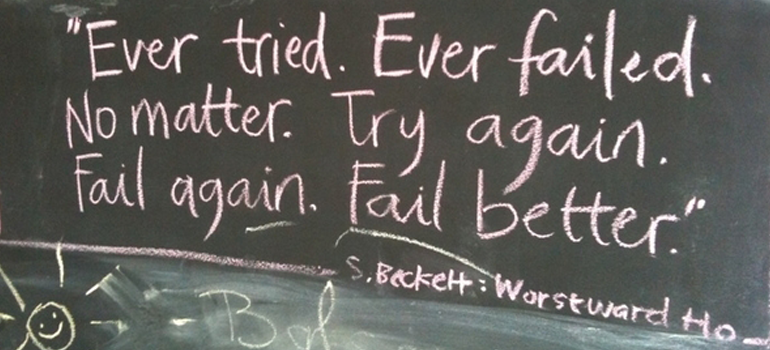M is obsessed with the magical room on the other side of the door (which we call the bathroom). She is standing on her tippy-toes, supporting her weight by pressing her knees against the door, her back arched and arms stretched as far as possible, trying to reach the knob. She is still an inch too short to reach and when she tries to stretch even further, she loses her balance and falls backwards. She wails, interspersing “Dada” and some babbles I don’t recognize between the tears. I tell her she’s okay and she looks at me, bangs her palms against the door twice and says “Dada” again.
Some parents would get up and open the door for her; others would pick her up, move her to the other side of the room and give her a toy to redirect her efforts. I’m honestly curious as to what she’ll do next.
Growing up, we are often told that failure is a bad thing – we should always strive to do everything correctly the first time. Ultimately, the biggest lesson taught is to stay within the limits of what we know we can do well and not to take a risk of making a mistake. According to Psychologies Magazine, correcting children’s mistakes, while a natural impulse, only serves to keep them from learning valuable lessons. They learn not to keep trying. And worse yet, children are robbed of opportunities to build confidence and independence, two of the very skills that are often needed for strong leadership skills. Increasingly, the power of failure is being harnessed by various industries – there is even a series of conventions across the world entitled “Fail Faire,” in which participants gather to share their most incredible failures, as well as the lessons learned from them. If we, as adults are embracing the power of mistakes, shouldn’t we be teaching our children to do the same?
M has pulled her baby laptop from across the room and wedged it against the door. She climbs on top of it, giving her an additional two inches of height, more than she needed to reach the knob. She looks at me, clasps her tiny hands around the knob and turns it to the right. It doesn’t budge. I smile and nod and she turns it in other other direction, the door inching forward. “Dada I di it,” she screams and jumps up and down with excitement, losing her balance and falling forward in the process. The door opens and she grins. I pick her up, tell her how proud I am of her, but really, I’m thinking it’s time to childproof that door.


